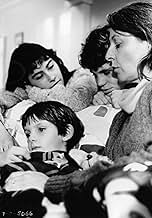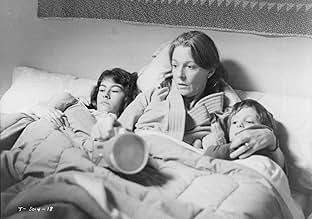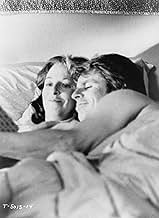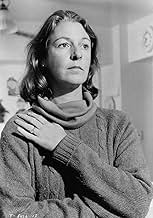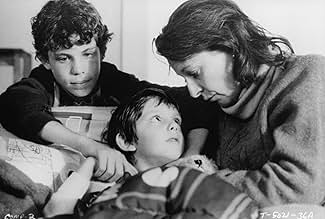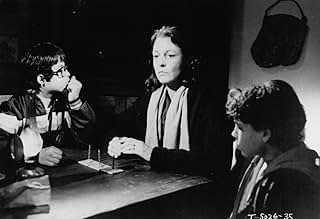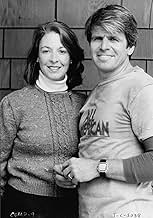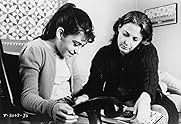CALIFICACIÓN DE IMDb
6.9/10
7.6 k
TU CALIFICACIÓN
Un ataque nuclear hace mella en la vida de una familia estadounidense de un barrio residencial.Un ataque nuclear hace mella en la vida de una familia estadounidense de un barrio residencial.Un ataque nuclear hace mella en la vida de una familia estadounidense de un barrio residencial.
- Dirección
- Guionistas
- Elenco
- Nominado a 1 premio Óscar
- 2 premios ganados y 6 nominaciones en total
Rossie Harris
- Brad Wetherly
- (as Ross Harris)
William G. Schilling
- Pharmacist
- (as William Schilling)
- Dirección
- Guionistas
- Todo el elenco y el equipo
- Producción, taquilla y más en IMDbPro
Opiniones destacadas
This small film from 1983 might actually be more emotionally devastating than "Schindler's List" because it presents us with a horrific "what-if" scenario that I imagine scared the be-jesus out of viewers in the Cold War era that it was made and will send shivers down the spine of anyone who watches it today. The threat of nuclear holocaust may not be so looming now, but the threat of bio-terrorism or any other level of terrorist attack or all out war is very real in the post 9/11 era. This film is so stark and intimate that it really doesn't matter what these people are dying from (it could just as easily be biological warfare as it is nuclear fallout). I was so deeply effected by this film's portrayal or one family in one small California town getting cut off from the rest of civilization (which we can only assume is in the midst of WWIII) and slowly falling apart while one by one loved ones succumb to nuclear radiation that I couldn't watch it all. I had to flip the channels to watch a few minutes of "The Simpsons" before I turned back to watch the end. This is possibly the most depressing film ever made. Jane Alexander running frantically around the house searching for her youngest son's favorite stuffed animal and refusing to bury his body (wrapped in bedsheets) in the backyard until she found it is so heartbreaking that it made me sick. As such, this is the film that every politician the world over should watch before declaring any kind of war. War is not about winning or losing or politics or doing what it right, war is about the death of our children. Everyone needs to be reminded of that before making the war cry. In the end we all die.
I've been a fanatic of disaster movies and post-apocalypse Sci-Fi for practically my entire life already, but I have deliberately been avoiding the actual "nuclear bomb impact" films. There were several of these released during the early 80's. Apart from "Testament", there's also "The Day After", "Threads", "Letters from a Dead Man" and "When the Wind Blows". All these aforementioned films have high ratings, favorable reviews and impeccable cult-reputations. So, then why haven't I seen them before? Because the impact of these films, pretty much like the H-bomb itself, is downright devastating, and yours truly is a very sensitive person!
There's a world of difference between sci-fi films set in post-nuclear wastelands, where a handful of human survivors drive around in dune buggies and battle each other over a tank of fuel, and actually witnessing the long and excruciatingly painful process which leads to the complete extinction of mankind. And even though writer Carol Amen and director Lynne Littman absolutely restrain from turning "Testament" into a sentimental tearjerker, the film is inescapably harrowing, and numerous sequences caused me to burst into tears.
The story takes place in the peaceful little community of Hamlin, a suburb of San Francisco, and introduces the model family of Tom and Carol Wetherly and their three children. Everything they love and worked for literally vanishes in a bright and sudden flash. Hamlin's unusual geographical location, in a sort of mountain bowl, safeguards the town from instantaneous destruction, but this rapidly proves to be a curse instead of a blessing. Without any form of sensationalism, or raising idle hope, Littman depicts how the townspeople and loved ones succumb around Carol, whilst radio contact with the rest of the world fades even further away.
The aptly titled "Testament" is a beautiful, frustrating, haunting, infuriating and noble film all at once. The performances are stellar, and the use of music is staggering. The only remote default, according to me, isn't even a shortcoming in the film itself. I find it unjust that so many people must emphasize in their reviews that "Testament" was directed by a woman, and hence make the film somewhat of a monument of feminism. As far as I'm concerned, gender equality is incontrovertible, and women are just as skilled and talented as directors as males. Lynne Littman did a fantastic job as a director; - period!
There's a world of difference between sci-fi films set in post-nuclear wastelands, where a handful of human survivors drive around in dune buggies and battle each other over a tank of fuel, and actually witnessing the long and excruciatingly painful process which leads to the complete extinction of mankind. And even though writer Carol Amen and director Lynne Littman absolutely restrain from turning "Testament" into a sentimental tearjerker, the film is inescapably harrowing, and numerous sequences caused me to burst into tears.
The story takes place in the peaceful little community of Hamlin, a suburb of San Francisco, and introduces the model family of Tom and Carol Wetherly and their three children. Everything they love and worked for literally vanishes in a bright and sudden flash. Hamlin's unusual geographical location, in a sort of mountain bowl, safeguards the town from instantaneous destruction, but this rapidly proves to be a curse instead of a blessing. Without any form of sensationalism, or raising idle hope, Littman depicts how the townspeople and loved ones succumb around Carol, whilst radio contact with the rest of the world fades even further away.
The aptly titled "Testament" is a beautiful, frustrating, haunting, infuriating and noble film all at once. The performances are stellar, and the use of music is staggering. The only remote default, according to me, isn't even a shortcoming in the film itself. I find it unjust that so many people must emphasize in their reviews that "Testament" was directed by a woman, and hence make the film somewhat of a monument of feminism. As far as I'm concerned, gender equality is incontrovertible, and women are just as skilled and talented as directors as males. Lynne Littman did a fantastic job as a director; - period!
It's been TWENTY YEARS (!) since I've seen this movie in a theatre, and I've never yet forgotten it. If any movie can be said to be life-changing, this is it. TESTAMENT was first shown in theatres, and the film's power became front page headlines for quite some time. People were crying in theatres, and article after article told of how this extremely powerful film affected people. This was not hype; the emotional strength of this movie is genuinely powerful.
For myself, I held back as best I could from crying in the theatre (me being a 23 year old guy seeing it with two (married) friends). But the effect on me was apparently visible immediately: when I walked out of the theatre and passed thru the line of people waiting for the next showing, a woman, who was laughing with her friends, happened to look at me and her face went completely serious. I very nearly hugged her right there, this stranger. When I got home, I cried for about two hours. The film's themes affected my, at the time, concerns about love, relationships, and such like.
One scene I'll never EVER forget, the most devastating: the 13-ish year old daughter asks her mother, "What's it like?" MOTHER: "What's what like?" DAUGHTER: "Making love." The mother (Jane Alexander -- my God, what a performance!) tells her in a very frank and beautiful speech, and the daughter caps off that scene with a devastating remark that just kills you and got my tears flowing (I probably couldn't hold back at that point).
Before making TESTAMENT, director Lynne Littman had made only documentaries, so maybe that "realism" style added to the power and believability of this movie. One of my all time favorite supporting actors is in this film, and he does a fantastic job: Mako. He and the young retarded (Down Syndrome?) boy who plays his son make a phenomenal team. They're my favorite characters: so full of innocence, father so full of love, strength and pain. Agh... my god my god... what a movie. Whew.
For myself, I held back as best I could from crying in the theatre (me being a 23 year old guy seeing it with two (married) friends). But the effect on me was apparently visible immediately: when I walked out of the theatre and passed thru the line of people waiting for the next showing, a woman, who was laughing with her friends, happened to look at me and her face went completely serious. I very nearly hugged her right there, this stranger. When I got home, I cried for about two hours. The film's themes affected my, at the time, concerns about love, relationships, and such like.
One scene I'll never EVER forget, the most devastating: the 13-ish year old daughter asks her mother, "What's it like?" MOTHER: "What's what like?" DAUGHTER: "Making love." The mother (Jane Alexander -- my God, what a performance!) tells her in a very frank and beautiful speech, and the daughter caps off that scene with a devastating remark that just kills you and got my tears flowing (I probably couldn't hold back at that point).
Before making TESTAMENT, director Lynne Littman had made only documentaries, so maybe that "realism" style added to the power and believability of this movie. One of my all time favorite supporting actors is in this film, and he does a fantastic job: Mako. He and the young retarded (Down Syndrome?) boy who plays his son make a phenomenal team. They're my favorite characters: so full of innocence, father so full of love, strength and pain. Agh... my god my god... what a movie. Whew.
1983..The cold war was in full swing and the fear of nuclear armageddon hung over all our heads. ABC released "The Day After", (which I have already commented on) but in all the furor around that, "Testament" was released. This is THE 1980's nuclear war film. It doesn't deal with the effects on an entire community, but rather on one small, close knit family in California. Jane Alexander's performance was one of legend, and is possibly one of the classic dramatic performances of all time. The day begins innocently enough, dad heads off to work, the kids watch "Sesame Street"..then the Emergency Broadcast System cuts in and the world stops. Ignore all the Y2K mumbo-jumbo and put yourself back in 1983 (most of us know where we were) and watch this film. You may not be "entertained", but you will appreciate what you have just a bit more.
All of the comments i have read about this film focus on it's bleakness, on it's difficultly - due to subject matter, and many of them also quite rightly applaud the performance of Jane Alexander in the Central role. What none of them mention, and what seems so clear to me, is that this is a film that could only have been made by women.
There is no BIG EVENT here. No mass hysteria, violence, rape, disfigurement or any of those other factors that are paraded as horrifying in the majority of Nuclear War films - I am thinking specifically of Threads and The Day After Here.
In Testament we actually see humanity. We see how one family, one community copes with the devastation of just that - their family and their community.
This is what is so tragic, compelling and ultimately horrifying about this film. It is not a panache, it is not a broad canvas. It is about people not about issues and as such the humanity shines through.
I am not saying the other films aren't powerful in their way. They are - and both Threads and The Day After gave me nightmares. But Testament was so far beyond them in terms of simple courage and purpose. There was no grandiose, no glamour or tacked on love story. This was not hollywood, was life or the end of it, and all the more frightening for it.
Testament is one of the main reasons why we should see more women making politic films - and perhaps running a few more countries.
There is no BIG EVENT here. No mass hysteria, violence, rape, disfigurement or any of those other factors that are paraded as horrifying in the majority of Nuclear War films - I am thinking specifically of Threads and The Day After Here.
In Testament we actually see humanity. We see how one family, one community copes with the devastation of just that - their family and their community.
This is what is so tragic, compelling and ultimately horrifying about this film. It is not a panache, it is not a broad canvas. It is about people not about issues and as such the humanity shines through.
I am not saying the other films aren't powerful in their way. They are - and both Threads and The Day After gave me nightmares. But Testament was so far beyond them in terms of simple courage and purpose. There was no grandiose, no glamour or tacked on love story. This was not hollywood, was life or the end of it, and all the more frightening for it.
Testament is one of the main reasons why we should see more women making politic films - and perhaps running a few more countries.
¿Sabías que…?
- TriviaThe film was originally shot as a made-for-TV movie. Paramount executives were so impressed with it that they released it in theaters as a feature. The cast sued the producers for higher pay, claiming they were paid television salaries and not feature film salaries. The case was settled out of court.
- Citas
Mary Liz Wetherly: [Remember] the morning I walked in on you and Dad?
Carol Wetherly: Yes.
Mary Liz Wetherly: What's it like?
Carol Wetherly: What's what like?
Mary Liz Wetherly: Making love. Don't play mother with me.
Carol Wetherly: That's what I am.
- Bandas sonorasAll My Loving
(1963)
By John Lennon and Paul McCartney
Produced by Andrew Dorfman
Performed by Mitch Weissman
Courtesy of Mac Len Music
Selecciones populares
Inicia sesión para calificar y agrega a la lista de videos para obtener recomendaciones personalizadas
Detalles
- Fecha de lanzamiento
- País de origen
- Idioma
- También se conoce como
- Das letzte Testament
- Locaciones de filmación
- Productoras
- Ver más créditos de la compañía en IMDbPro
Taquilla
- Total en EE. UU. y Canadá
- USD 2,044,892
- Fin de semana de estreno en EE. UU. y Canadá
- USD 317,996
- 6 nov 1983
- Total a nivel mundial
- USD 2,044,892
Contribuir a esta página
Sugiere una edición o agrega el contenido que falta



